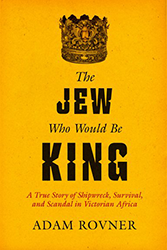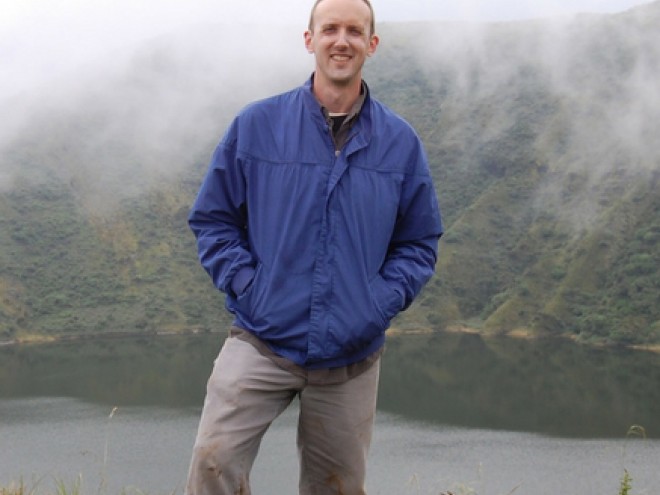
The protagonist of Saul Bellow’s Henderson the Rain King (1959) bawls out a manic refrain that serves as his credo: “I want, I want!” Henderson, a restless millionaire, leaves his family behind to travel to an imaginary African country — a mash-up of Eastern, Western, and Southern Africa. There he befriends the European-educated King Dahfu. After displaying his extraordinary physical prowess, Henderson finds himself heir to Dahfu’s throne and venerated as the eponymous Rain King. The wise Dahfu attends to Henderson’s soul during wide-ranging conversations that carry more than a whiff of dorm room bong-philosophy. Many readers today find Bellow’s novel to be an entertaining, though at times offensive, burlesque of colonialism. But not so fast…what if someone like Henderson had actually existed? That someone was nineteenth century Anglo-Jewish merchant and explorer Nathaniel Isaacs.
Isaacs was born in 1808 in Canterbury, England. After the death of his father, Isaacs’ impoverished mother sent him to the island of Saint Helena, a British territory in the South Atlantic Ocean. There the teenaged Isaacs worked for his maternal uncle and learned the import-export business. His wealthy uncle, Saul Solomon, had once been a confidant of Napoleon Bonaparte during his exile on Saint Helena. Dazzled by Solomon’s fortune and impressed by tales of the late French Emperor, Isaacs absorbed the lessons that gave him an insatiable appetite for money, power, and adventure. Like Bellow’s Henderson, Isaacs’ motto might as well have been “I want, I want!”
On his first trading voyage to southern Africa, Isaacs was shipwrecked. He and the other survivors found themselves on the edges of the Zulu Kingdom, then ruled by the indomitable King Shaka. Isaacs was drawn to Shaka’s charisma and fascinated by Zulu military discipline. Shaka treated Isaacs and the other Europeans who had washed up on his shores as vassals. And like his other Zulu subjects, Shaka commanded the European arrivals to fight for him against his many enemies. Isaacs volunteered for one such skirmish and was gravely injured in battle. Yet thanks to an iron constitution, Isaacs swiftly recovered and was made a chieftain by Shaka, who also granted him territory in recognition of his bravery. Isaacs lived among the Zulu for more than six years and during that time he became a trusted confidant of King Shaka. Upon his return to England, Isaacs published the first eye-witness account of the Zulu people and their legendary king. His much-reviewed book, Travels and Adventures in Eastern Africa (1836), presents an early ethnography of the Zulu nation. Isaacs’ book also forms the basis of the mythology of Shaka Zulu — a Black African icon — to this day.
In my new book, The Jew Who Would Be King, I tell Isaacs’ remarkable story for the first time and reveal the dark secrets behind the glowing newspaper accounts and the laudatory missionary reports.
The real-life Isaacs then went on to outdo even the prodigious exploits of Henderson. He became a wealthy, powerful, and influential merchant in West Africa, and was commissioned by the British governor of Sierra Leone to negotiate treaties that put an end to stubborn slave-dealing in regional kingdoms. Isaacs even purchased a small island, Matakong, now controlled by Guinea. He ruled the island as his personal fiefdom. There he built a modern port, established a private militia, and erected a fortress. English journalists arrived in Matakong to wonder at Isaacs’ development of the island. Methodist missionaries praised Isaacs for setting up a school. From distant London, powerbrokers marveled at the achievements of “the Jew” Isaacs, whom they recognized as the “sole monarch” of Matakong.
In my new book, The Jew Who Would Be King, I tell Isaacs’ remarkable story for the first time and reveal the dark secrets behind the glowing newspaper accounts and the laudatory missionary reports. Isaacs, like Henderson, displayed physical strength and stamina, bravery, and an endless wellspring of chutzpah. Also like Henderson, Isaacs was volatile, possessed by dark desires, and exhibited an overweening pride. Had Bellow known of Isaacs, perhaps the one-time anthropology student would have made Henderson even more outsized a character than he did.
I spent years sourcing archival material about Isaacs in England, South Africa, Saint Helena, and Sierra Leone. Just before COVID shut down travel, I ventured to Matakong. There I discovered remnants of Isaacs’ former rule: the foundations of his pier, the outline of his compound, and even the gravestone — carved in Hebrew — of his brother who died of disease on the island.
Throughout my pursuit of Isaacs’ story, a private chorus of “I want, I want!” echoed in my head and impelled me onward. My first night on Matakong, I learned what Henderson and Isaacs had: internal and unnameable voices can drive you to the ends of the earth, and sometimes to your peril.




